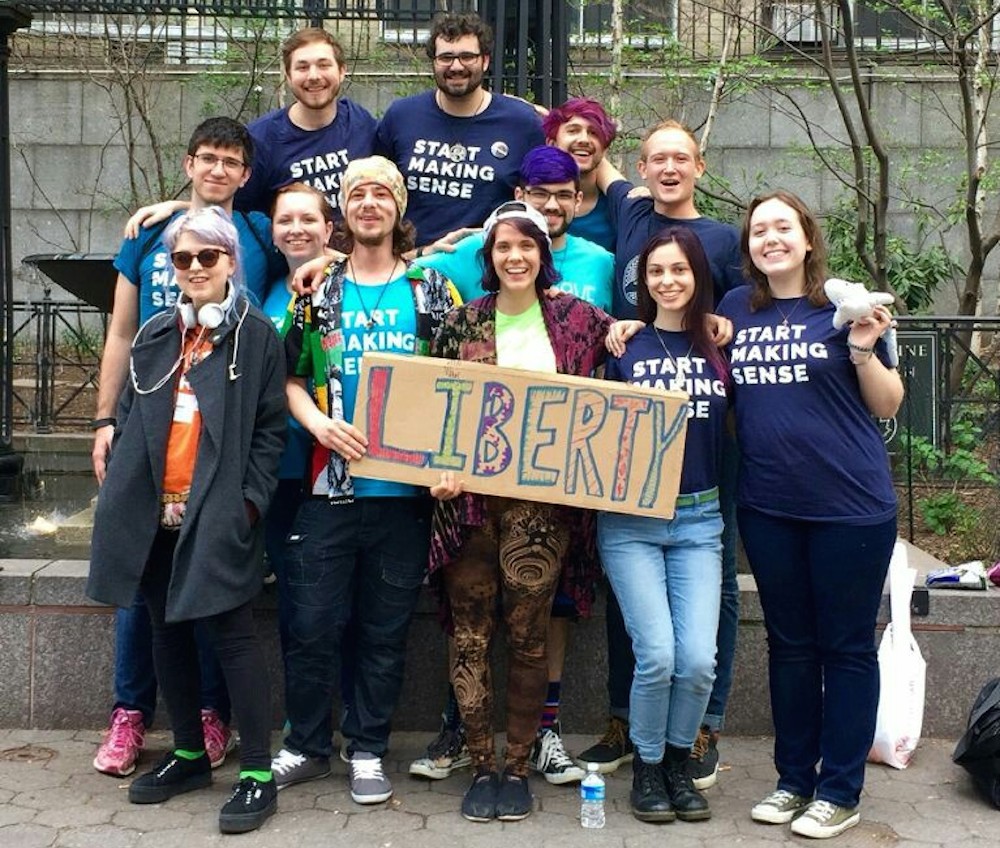
On Monday afternoon, about 200 young activists gathered outside of the United Nations in New York City to protest the decades-long War on Drugs.
The demonstration happened in time for the UN General Assembly Special Session (UNGASS) on drugs, the highest-level gathering on drug policy in nearly two decades, where world leaders set the tone for the future of global drug policy. The slogan of the last UNGASS in 1998 was very reflective of the time: “A Drug Free World, We Can Do It!” But since then, the momentum has swung in the favor of drug law reformers, as a growing number of U.S. states and countries like Portugal and Uruguay embrace legalization and decriminalization in lieu of the “War on Drugs.”
“We’ve all witnessed and experienced different harms done in the name of the drug war,” Jennifer Purdon, a junior from the University of Connecticut, told The Fix in an email interview. “For myself, the drug war is a complete violation of the human rights of millions of people.” Purdon is the chapter president of UConn Students for Sensible Drug Policy, just one of the hundreds of SSDP offshoots scattered across the globe. Students for Sensible Drug Policy (SSDP) is an international network of youth against the drug war, and the group that organized the UNGASS rally.
About 200 protestors gathered outside of the UN to demand reform. Sarah Merrigan, who founded the SSDP chapter at the University of Nebraska Omaha and currently serves as an SSDP board member, said the atmosphere was “incredibly powerful” as young people took the mic and shared their personal grievances against the drug war. “Our goal was to amplify (literally and figuratively) the youth voice in order to show we are tired of being tokenized in discussions about drug policy, and essentially told to be seen and not heard,” Merrigan told The Fix.
Many at the rally had come straight from Arlington, Virginia, where the annual SSDP conference took place over the weekend. More than 500 advocates, including students from Nigeria, Mexico and Ireland, attended the conference to discuss the current state of drug policy and to strategize for future reforms. A major topic was marijuana legalization, as several more U.S. states gear up to legalize medical or recreational cannabis this November.
SSDP has campus coordinators working in Massachusetts, Florida, Arizona and Nevada to help organize marijuana legalization efforts, gathering signatures for ballot initiatives and spreading the word on campuses, says Merrigan.
In Connecticut, the SSDP chapter at UConn passed a student government resolution in support of marijuana legalization, which the group then took to the State Capitol this month to lobby legislators in support of HB 5236, a bill to legalize and regulate marijuana in the state.
The UConn chapter also engages fellow students and its local community through harm reduction and drug education initiatives, Purdon told The Fix.
Overdose prevention was one of the topics addressed at the SSDP conference. Students were taught how to administer naloxone to someone who is overdosing, and how to bring naloxone access and Good Samaritan policies to their respective communities. Many SSDP chapters work to implement medical amnesty policies on campuses across the country to “guarantee amnesty for individuals who call for help in the case of a drug-related emergency,” said Merrigan.
The need for such policies is growing as families, communities, and lawmakers search for ways to reverse the rising number of opioid-related deaths in the U.S.
Alixe Dittmore, the vice president of UConn SSDP, knows this firsthand. “I’ve had friends and family members that got into accidents, were overprescribed pain medication and found themselves unable to stop once their prescription ran out,” she told The Fix. She says she personally knows more than ten people who have succumbed to heroin addiction in her hometown of Stafford Springs, Connecticut, where she says the problem is “still very prevalent.”
Dittmore has brought the issue to light in SSDP meetings. Members of her chapter have been trained on naloxone administration and have engaged with state representatives to address the Northeast’s growing heroin problem. But, she says, it’s impossible to properly address the nation’s opioid crisis while addicts continue to be shunned by society. “As a society, we tell heroin users that we don’t care about them. That they deserve to die or to be incarcerated for suffering from an illness,” she said. “In a society that demonizes and dehumanizes those suffering from addiction or those that simply use certain substances, it makes absolute sense that users are getting worse.”
It’s safe to say that the efforts of grassroots organizations like Students for Sensible Drug Policy have fueled the momentum toward “policies rooted in evidence, compassion and human rights,” as its mission states. It’s been nearly half a century since former U.S. President Richard Nixon declared the War on Drugs, and today, 24 U.S. states allow the medical use of cannabis, and four states and the District of Columbia have legalized cannabis for recreational use. After this election day in November, those numbers are expected to grow.
But until governments stop punishing people for drugs, SSDP will continue to “fight the good fight” on the frontlines of drug policy reform, giving a voice to young people across the globe, engaging face-to-face with lawmakers and educating their peers on the collateral consequences of the drug war.
“We are lied to as children and are taught to demonize certain substances and the people who choose to use them,” said Purdon. “This cycle of oppression and utter denial of truth has only exacerbated the destruction that’s ensued in the name of protecting our nation, especially young people.”
